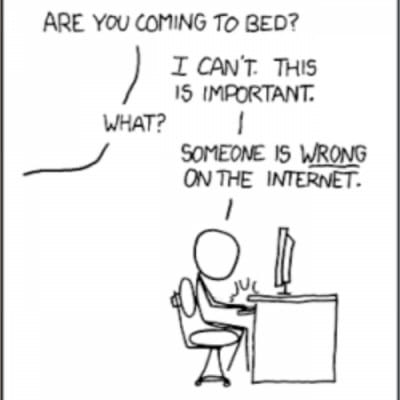Responding to Flak on the Interweb

Whether it's posting your first musical composition, short-story or your stance on the socio-economic ramifications of genetic engineering, sharing your work or opinions for the world to see only to have it torn apart is a daunting experience. So what is the best way to respond to online criticism?
Don't be blindsided by criticism, expect it
Mustering up the enormous amount of courage required to share your work or insight with the masses is incredibly difficult, especially for those who are inherently introverted. But by sharing it on social media you are not only opening the doors to admirers and potential patrons, you are inviting all manner of disgruntled critics and envious artists to pick at you until all that remains is a cluster of nerves and a shattered confidence. Remember that by sharing material on a public platform, along with the exposure and gratification of having yourself promoted, you are consenting to its associated perils. Revelling in compliments and displaying frustration at criticism is naïve. You cannot respond to negative comments by saying it is none of their business, by posting it online, you are making it their business. It is important to prepare yourself for criticism, constructive or otherwise. The safety and freedom of their bedrooms bolster the confidence of internet trolls and make them more brazen.

Method in the madness
In situations like these objectivity is the key and one would need to be able to depersonalise the issue before proceeding. You will not always be a manufacturer of impregnable genius or a well of bullet-proof, immaculate arguments. Occasionally, you might realise that your detractors, although harsh and unforgiving in their abuse, do raise some credible concerns. So take a breath and consider. Learn to recognise when you are the one at fault and gracefully admit your mistakes. People often respond positively to sincere apologies and the entire incident would be soon forgotten, only to serve as a learning experience.
Pick your battles
It is crucial to differentiate between critics who post measured responses and those who are looking for kicks or to release pent-up angst. More often than not, your detractor will not respond to reason or any logical argument and it would serve you best to ignore them.
Sometimes though, a critic's attacks may gain momentum, owing to our proclivity for condescension or aggressive humour. It is much easier to instigate a lynch mob than it is to incite a righteous rebellion. That may be the ideal moment to step in and say your piece. One should, however, remember to be clear, concise and most importantly, sincere. Instead of posting several volumes of explanations and letting the argument spiral out of control into an online slug-fest, spend ample time and consideration on your response. Refrain from conveying malice of any kind and don't include a single unnecessary word. Ask people you respect for help; clear away any misunderstandings that may have arisen and be transparent when stating your intentions.
After you've said your piece you should learn to let go. Assuming you were not at fault and were sincere throughout, the ones capable of rational thought should be appeased. And the ones that are not are beyond your control.
There's a word called “katagelasticism”, which refers to the psychological condition of enjoying humour at the expense of others excessively. You should acknowledge the anxiety, lasting psychological trauma and misery that can stem from such cyber abuse and remember never to repeat those mistakes yourself.
Remember, no one really likes an internet troll.
Adit Hasan likes to dabble, making him jack of all trades, master of none. The only constants in his life are penguins and mangoes. Send mixtape to facebook.com/adit.hasan.3

 For all latest news, follow The Daily Star's Google News channel.
For all latest news, follow The Daily Star's Google News channel. 



Comments